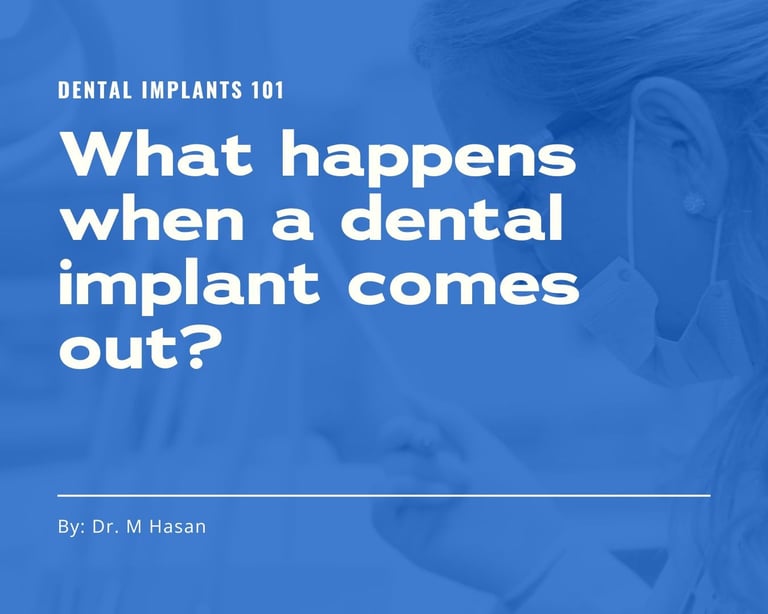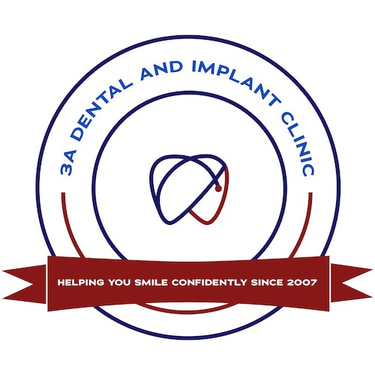What happens when a dental implant comes out?
Know why dental implants might fail and come out, the reasons and common triggers towards failing dental implants.
DENTAL IMPLANTS


Dental implants are a long-term solution for missing teeth, but in some cases, they can fail or come out completely. While this can be distressing, it is essential to understand why it happens and what steps to take if it occurs.
Why Do Dental Implants Fail or Come Out?
There are several reasons why a dental implant may fail, ranging from surgical errors to improper post-care. Below are the most common factors:
While I am citing this as a first reason in this blog post, it does not mean that most failures happen due to this reason only, these points are not based on order, rather just for informative purposes.
1. Poor Treatment Planning by the Surgeon
A well-planned implant procedure requires evaluating multiple factors, including:
The number of implants needed for proper support
The quality and quantity of available bone
Any existing periodontal (gum) disease
The patient’s medical history, which could affect healing.
Failure to consider these aspects may result in implant failure.
2. Wrong Case Selection
Not all patients are suitable candidates for dental implants. Certain conditions, such as uncontrolled diabetes, severe gum disease, or heavy smoking, can lead to implant rejection. If a patient with high risk factors undergoes an implant procedure without proper precautions, the implant may fail.
3. Not Following Post-Operative Instructions
After an implant procedure, the patient must follow specific guidelines provided by the dentist. Ignoring post-operative care instructions, missing follow-up appointments, or engaging in habits like smoking and excessive biting pressure can lead to implant loosening.
4. Poor Oral Hygiene
Maintaining good oral hygiene is critical for the success of dental implants. Patients who fail to brush and floss regularly may develop infections like peri-implantitis, which causes bone loss around the implant, ultimately leading to its failure.
5. Inadequate Number of Implants
A proper balance between the number of implants and the amount of bite force (load) is necessary. If too few implants are placed to support the bite force, excessive pressure may be applied to each implant, leading to failure over time.
6. Bone Deficiency or Improper Healing
In some cases, insufficient bone volume or poor healing of the implant site can contribute to implant failure. This can be due to bone resorption, untreated infections, or improper osseointegration (the fusion of the implant with the bone).
What to Do If a Dental Implant Comes Out?
If your dental implant comes out, do not panic. Follow these steps:
Visit Your Implant Dentist Immediately – Your operating dentist will assess the implant site to determine the reason for the failure. Avoid trying to fix or reinsert the implant on your own.
Diagnosis and Treatment Planning – The dentist will identify the cause of failure and create a revised treatment plan.
Replacing the Implant – In most cases, the failed implant can be replaced with a new one after proper assessment.
Bone Augmentation (If Needed) – If bone loss is detected at the implant site, bone grafting may be required before a new implant can be placed.
Combination of Bone Augmentation and Implant Placement – In some cases, both procedures may be performed simultaneously to ensure long-term implant stability.
Waiting for Favorable Healing Conditions – If the oral or bone environment is not suitable for immediate implant replacement, your surgeon may recommend waiting a few months before proceeding with the next step.
While dental implants have a high success rate, they are not immune to failure. Understanding the causes of implant loss and seeking timely professional care can significantly improve the chances of a successful re-implantation. If you experience any implant-related issues, consult your dentist as soon as possible to explore the best possible solutions.




MEET THE DOCTOR
Dr M. Hasan has been practicing since 2007. He began his own practice in 2008. He has been successfully practicing implantology since 2012. He completed his practice from C.C.S University and has studied implantology from Singapore.

